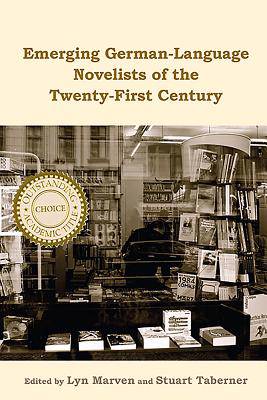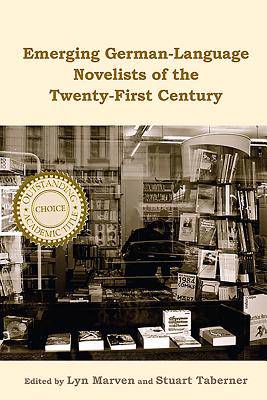
Bedankt voor het vertrouwen het afgelopen jaar! Om jou te bedanken bieden we GRATIS verzending (in België) aan op alles gedurende de hele maand januari.
- Afhalen na 1 uur in een winkel met voorraad
- In januari gratis thuislevering in België
- Ruim aanbod met 7 miljoen producten
Bedankt voor het vertrouwen het afgelopen jaar! Om jou te bedanken bieden we GRATIS verzending (in België) aan op alles gedurende de hele maand januari.
- Afhalen na 1 uur in een winkel met voorraad
- In januari gratis thuislevering in België
- Ruim aanbod met 7 miljoen producten
Zoeken
Emerging German-Language Novelists of the Twenty-First Century
€ 137,45
+ 274 punten
Omschrijving
After the international success in the 1990s of authors such as Bernhard Schlink, Marcel Beyer, and Thomas Brussig, an impressive number of new German-language novelists are making a significant impact. Some, like Karen Duve, Daniel Kehlmann, and Sasa Stanisic, have achieved international recognition; some, like Julia Franck, have won major prizes; others, like Clemens Meyer, Alina Bronsky, and Ilja Trojanow, are truly "emerging authors" who have begun to attract attention. Between them they represent a range of literatures in German, from women's writing to minority writing (from Turkish immigrants and Eastern Europe), to "pop literature" and perspectives on the former GDR and on Germany's Nazi past. This volume devotes individual essays to fifteen such writers, examining in detail a major work of each. Translated excerpts from works by Vladimir Vertlib and Clemens Meyer round out the book, which will be of interest not only to academics and students of English and Comparative Literature in the UK, the US, and beyond, but also to the general reader, for whom titles of texts and quotations are translated. Contributors: Lyn Marven, Stuart Taberner, Anke S. Biendarra, Stephen Brockmann, Rebecca Braun, Frauke Matthes, Brigid Haines, Julian Preece, Emily Jeremiah, Valerie Heffernan, Barbara Mennel, Heike Bartel, Kate Roy, Andrew Plowman, Sonja E. Klocke, Jamie Lee Searle, Katy Derbyshire. Lyn Marven is a Lecturer in German at the University of Liverpool. Stuart Taberner is Professor of Contemporary German Literature, Culture, and Society at the University of Leeds.
Specificaties
Betrokkenen
- Uitgeverij:
Inhoud
- Aantal bladzijden:
- 273
- Taal:
- Engels
- Reeks:
Eigenschappen
- Productcode (EAN):
- 9781571134219
- Verschijningsdatum:
- 3/10/2011
- Uitvoering:
- Hardcover
- Formaat:
- Genaaid
- Afmetingen:
- 177 mm x 250 mm
- Gewicht:
- 603 g

Alleen bij Standaard Boekhandel
+ 274 punten op je klantenkaart van Standaard Boekhandel
Beoordelingen
We publiceren alleen reviews die voldoen aan de voorwaarden voor reviews. Bekijk onze voorwaarden voor reviews.








